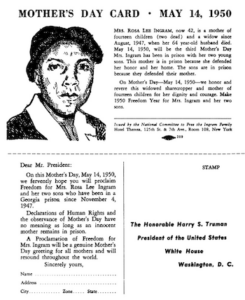
Civil Rights Congress flyer (Ingram)
*The Civil Rights Congress (CRC) was formed on this date in 1946. They were an American civil rights organization.
The CRC began at a conference in Detroit with about 10,000 members at its peak. Around 1948, the CRC became involved in representing blacks sentenced to death and other highly prominent cases to highlight racial injustice in the United States. After Rosa Lee Ingram and her two teenage sons were convicted in Georgia, the CRC conducted a national appeals campaign on their behalf, their first for African Americans.
Soon after, the CRC became a target of the House Committee on Un-American Activities (HUAC) and the Internal Revenue Service. A 1947 report to HUAC charged: "Having adopted a line of militant skullduggery against the United States with the close of World War II, the Communist Party has set up the Civil Rights Congress for protecting those of its members who run afoul of the law." In December 1947, the National Negro Congress merged into the group. International Labor Defense (ILD) national secretary William Patterson led the group. The group denied these charges and provided a list of sponsors, including Representatives Adam C. Powell, Senator Glen H. Taylor, and Atlanta University President Rufus Early Clement. Patterson called the group "non-partisan" and described it as "the Red Cross of the defenders of peace, constitutional rights, justice, and human rights."
Frank Marshall Davis served on the organization's National Executive Board. Patterson headed the Abraham Lincoln School in Chicago, with Davis on the faculty and Board of Directors. The CRC was generally more assertive on the coasts and weak in the South, but it did conduct several significant campaigns to defend the legal rights of Southern blacks. New Orleans and Miami were the South's most influential and vital chapters. Altogether, the CRC founded more than 60 local chapters. The CRC took up legal causes, pursuing legal campaigns, often alongside the NAACP; the group received many letters from prisoners requesting legal assistance. The CRC coordinated nationally, with 60 chapters at its peak in 1950.
These acts on local issues were on the East and West coasts, with only about ten chapters in the states of the former Confederacy, five of them in Texas. The 1950 McCarran Internal Security Act increased government persecution of the group, and many of its leaders were jailed. The group's power weakened in 1951 when the federal government barred it from posting bail for communist defendants in the resulting trials. The Federal Bureau of Investigation also infiltrated the CRC. FBI agent Matthew Cvetic, who had joined the Communist Party, testified to HUAC in 1950 that the CRC was Communist-controlled and that Patterson was a Communist.
He also identified many politicians as Communists, celebrities, and community leaders as Communists. Various other agents surfaced to testify at anti-Communist trials. Association with the Civil Rights Congress justified the FBI surveillance of Lena Horne and Paul Robeson. One agent later described breaking into the CRC's Chicago offices, saying, "Anything that had the name 'committee' or 'congress' the FBI assumed had to be subversive." David Brown, secretary and then chair of the Los Angeles chapter of the CRC, served as an FBI informant from 1950 to 1954. He disappeared in January 1955 and tried to fake his kidnapping.
Soon after, he unsuccessfully attempted suicide in a hotel room. He later said he felt ashamed and suicidal for being a "stool pigeon." He testified that his pay varied from $25/week to $250/month and that he routinely lied to FBI contacts. The U.S. Congress and courts weakened the group with legal restrictions in 1951. In 1956, the CRC was declared a communist front by the Subversive Activities Control Board; that same year, members voted to disband.